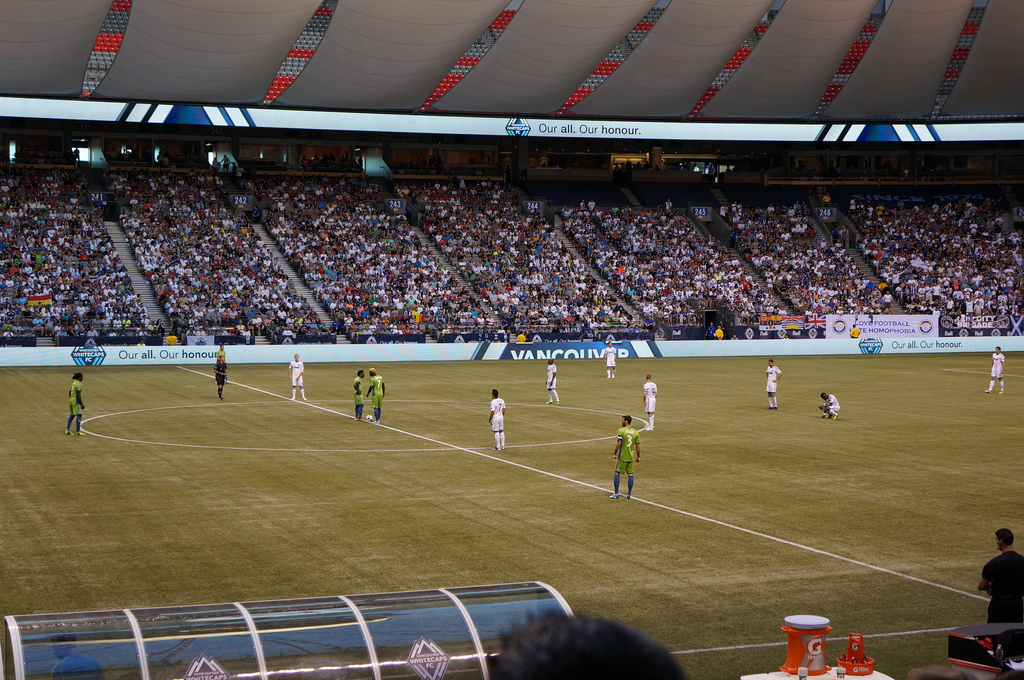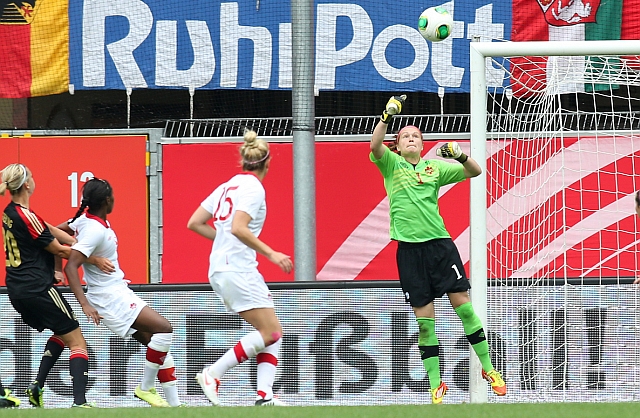
Photo RosieTulips/Flickr
There are few experiences so helpless for a fan as watching a lead slip away.
But on Saturday, the Vancouver Whitecaps did not meekly let a victory slip away or even sheepishly escape with points they did not deserve. They improved at half-time, pushed hard in the attack and scored at the very beginning and the very end to finally pick up a 2-0 victory against the Seattle Sounders.
Seattle, of course, has made Vancouver feel helpless before. Despite a respectable record against the Sounders in the second division — 5 wins, 7 defeats and 9 draws from 2004 to 2010 — Seattle has made Vancouver miserable in MLS, with the Whitecaps losing six times, drawing four and winning precisely never.
This especially hurts because it is Seattle. With the great success Seattle had entering the league, both in terms of results and community engagement, the Whitecaps made noise about copying their approach when they made the same jump. But of course, the 2011 season didn’t go nearly as well. For Vancouver, the results against Seattle (and Portland), coupled with the image of crowds over 40,000 uniformly standing and singing, scarves aloft, is enough to make the Whitecaps fan despair that perhaps they are miles behind their Cascadia rivals as they watch tourists in green dance up Robson Street after the final whistle.
At least three times, the Whitecaps have given up leads against Seattle. 2011 brought a 3-1 home loss, the last game played in Empire Field, which started so brightly with a goal from Camilo. Last season’s rollicking 2-2 draw at BC Place was going to be a win until Fredy Montero scored in the 90th minute. And of course, there was the defeat in Seattle last month, when the other shoe dropped in the form of a 2-1 road win flipping to loss late, again.
Surrendering points from a winning position has become The New Problem for the Whitecaps after the demoralizing loss to Montreal in the final of the Canadian Championship, a thread that runs through the Seattle game and to the last game against Kansas City. I mean, we will take a point from an out-of-conference road game and four from six points on the trip, thank you, but it’s been worrying.
So when Kenny Miller cut through with an early goal at BC Place on 4 minutes, the first feeling was elation. The goal came from nothing, a great ball that Corey Hertzog arced from the halfway line without looking speculative. Miller bamboozled Hurtado with a cut to the right and slapped the ball with the side of his foot, leaving it to run past two sprawling Sounders. The effect Miller’s return has had on this team has been tremendous; his technique and experience has now wholly eclipsed his disappointing first season.
However, the next feeling was fear. The Whitecaps were defensively terrifying in the first half. All the defenders produced decent plays, but Seattle, especially the tandem of Obafemi Martins and Lamar Neagle, found it just too easy to slice through. For the fan bruised often and recently by collapses from early leads, it seemed saner to prepare for disappointment again.
Brad Knighton’s performance in this half was one of the most important of his career. Despite winning the starting role mid-season two consecutive years there remains, as Ben Massey recorded, a feeling that perhaps neither Knighton nor Joe Cannon are good enough.
Just as the club’s move to bring in David Ousted from Denmark validated that sentiment, Knighton has been fighting like hell to retain his grip on the spot in the two weeks between the signing and when Ousted is eligible to suit up. A save on Martins as he drifted over on 22′ and two quick saves in procession after a Neagle corner were crucial in keeping the Caps level by halftime. Ousted is active now, and will play in the reserves tomorrow. Knighton’s seven-save clean sheet was a fierce effort to ensure he stays there.
Despite Knighton’s heroics, the outfielders did not inspire confidence in the first half. But something shifted in the second period.
Jun Marques Davidson, who had been invisible before the interval, stepped up and took control of the fulcrum at midfield, helping create a logjam in the Whitecaps area. (Most notably: Intercepting a dangerous Brad Evans pass from the goal line.) The midfield was a lot more challenging to pass through for the Sounders, and that’s because the Whitecaps were much better off the ball, depriving Seattle of time and options in possession.
When Corey Hertzog, admirably filling in up front for the absent Russell Teibert, was taken off on 63′ with a left-ankle sprain, the TSN commentators wondered aloud: defense or attack? Should manager Martin Rennie bring in a pacy young forward like Kekuta Manneh to cause problems or act conservatively, perhaps bringing on a midfielder to folding the 4-3-3 into a more defensive formation to grind out a 1-0 result?
The way the Whitecaps handled this question can tell you everything about how they did not simply avoid defeat but seize victory. Before Daigo Kobayashi’s introduction, the ‘Caps had a total of four shots, only two on goal. But Daigo helped reinvigorate the attack, pushing the play up the pitch so that Seattle had to make up ground to try and mount any kind of assault of their own.
The next sub sealed the attack-is-defense approach: Darren Mattocks. So quiet lately, appearing only once in the last six games, Mattocks exploded onto the pitch, matching the intensity of the crowd with a rapid five shots and quick runs, terrorizing poor Djimi Traore.
The decision to play attacking players like Kobayashi and Mattocks is what sealed victory. And when a Knighton goal kick — clean sheet and an assist! — was flicked on at the centre circle by Gershon Koffie, Mattocks did the rest himself, chesting the ball down, cutting through Traore and batting a half-volley up and over.
2-0. With 11 minutes left, that was something like certainty. Knighton stayed strong. Mattocks kept coming out of nowhere to terrorize Seattle on the break. There would be no capitulation. The fear of lingering oblivion that was thick and black after the Canadian championship vanished into thin air. The Whitecaps are on top of the Cascadia Cup standings.
It was a good night to walk down Robson after a Seattle game for the fans in blue, for once.
Stats after the jump.
Continue reading →

